CIA Sponsored Terror, Civil Liberties, Criminalizing Dissent, Crony Capitalism, Habeas Corpus, Human Rights, Political Prisoner, Prison Industry, Supreme Court, Surveillance, Torture
Podcast: Play in new window | Download

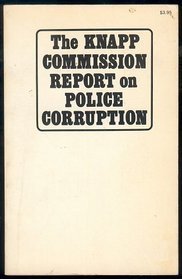
Blood On Their Hands: The Racist History of Police Unions
The NYPD police officer union’s outrageous assertion that New York Mayor Bill de Blasio had “blood on his hands” in the murder of two NYPD officers, is consistent with the reactionary role of police unions across the country. They came to prominence in the wake of the civil rights movement. Police unions have played a powerful role in resisting all manner police reforms and in defending police officers no matter how outrageous and racist their actions. Attorney Flint Taylor brought an analysis of police unions playing a major role in defending cops throughout the last few decades in his article Blood On Their Hands: The Racist History of Police Unions.
Attorney G. Flint Taylor:
- I started to look at this because I had been in battle with the union here in Chicago, the Fraternal Order of Police, since I’ve been a lawyer which is almost 45 years.
- After I saw what was happening in New York, I did some research on New York as well as brought back to memory a lot that had happened here in Chicago.
- In New York I took it all the way back to Mayor Lindsey when he attempted to deal with and bring about a civilian review agency of the police department.
- One of the instances (in New York) police showed their displeasure by running through the black community banging on the tops of garbage cans, waving their guns around and Abe Beame had to get a restraining order to stop them.
- The racism of it all became more apparent under Mayor Dinkins reign in the 90s, when he again revisted the idea of strengthening the civilian review agency.
- Sometimes you find that the union is to the right of the police hierarchy.
- When I put together the article and studied New York over the last 50 years and brought together my understanding here in Chicago, is that they’re so fundamentally racist. They don’t even represent all of the cops.
- They represent the white power structure, the most reactionary aspects of the department.
- Whenever racism is at the heart of police actions, you’ll find the union shoulder to shoulder defending those actions by those cops.
- In Chicago it started around the Democratic National Convention in 1968. The murder of Fred Hampton and Mark Clarke, the Black Panther leaders.
- Of course the FOP became extremely actively involved in defending the indefensible in the Jon Burge police torture cases and has been at the heart of it here in Chicago for 20-30 years in resisting all forms of justice in the Burge torture cases.
- Right after he (Burge) was fired by the police department in the mid-nineties, the union had the temerity to organize a float to honor Burge and the two other officers who were found to have tortured . . . in the St. Patrick’s Day parade.
- The union here again is a white officers union – not only that – the white officers union, it represents the racist interests of a certain click of police officers that patrol the communities of color here in Chicago.
- Until there’s a fundamental change in policing and the justice system, the union is going to have that kind of power and is going to continue to flank on the right, what already a reactionary, military force which is the police department.
- It’s basically universal maybe more so in the big urban areas.
- We have to educate our brothers and sisters in the broader labor unions like the SEIU and the unions that support the correctional officers.
- Police unions reflect police departments, police departments are occupying forces. They were created to put down the working class. They were created to protect the interest of what is now the one percent.
- So, how could they be part of the movement that deals with workers’ rights and fights against racism when that’s what they’re defending?
Guest – G. Flint Taylor, a graduate of Brown University and Northwestern Law School, is a founding partner of the People’s Law Office in Chicago, an office which has been dedicated to litigating civil rights, police violence, government misconduct, and death penalty cases for more than 45 years.
—–
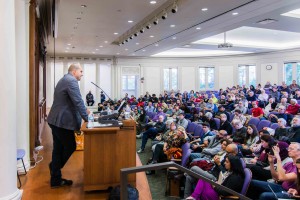
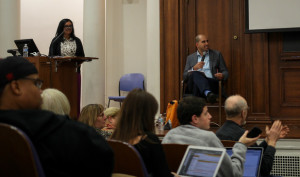
Inter-Nationalism: Encountering Palestine In American Studies
Professor Steven Salaita at age 39 had already written 6 outstanding books. He was a tenured professor at Virginia Tech University. He was offered a job with tenure at the University of Illinois in their American Indian Studies program. He accepted the job, and quit his other job, left his house, his wife did the same, left her job. They were enroute to Illinois for him to start working when he was told by Chancellor Phyllis Wise that he was not going to be hired. He was fired from a tenured job he had been offered at the University of Illinois because of his tweets criticizing Israel’s murderous war on the people of Gaza last summer .
Why? The university was under tremendous pressure as documentary evidence shows by private donors who said, you hire Salaita, we won’t give you money. The university caved. Salaita didn’t get his job. He’s now out of work and he’s about to file or will have filed a lawsuit trying to get his job back and reassert the principles of academic freedom, academic shared government and free speech. We hear a presentation by Steven Salaita titled Inter-Nationalism: Encountering Palestine In American Studies delivered at New York University November 2014.
——————————————————————-

Please help support Law and Disorder by clicking on Fractured Atlas graphic. This radio show is now a sponsored project of Fractured Atlas, a non-profit arts service organization. Contributions for the charitable purposes of Law and Disorder must be made payable to Fractured Atlas only and are tax-deductible to the extent permitted by law. You can donate as little as 5.00 a month.
CIA Sponsored Terror, Civil Liberties, Criminalizing Dissent, Gaza, Guantanamo, Habeas Corpus, Human Rights, Military Tribunal, NSA Spying, Political Prisoner, Prosecution of the Bush Administration, Supreme Court, Surveillance, Targeting Muslims, Torture, War Resister
Podcast: Play in new window | Download
Updates:
- Michael Ratner: Moazzam Begg Freed After Terrorism Charges Dropped
- Michael Ratner: 149 Inmates In Guantanamo Bay Prison – 79 Approved For Transfer
——-
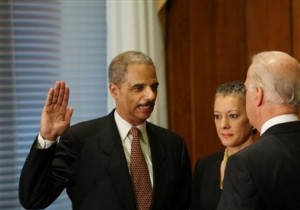

U.S. Attorney General Eric Holder Evaluation
Michael Ratner and Heidi Boghosian draw a balance sheet on the record of U.S. Attorney General Eric Holder.
- Holder approved drone killing of American citizen al-Awlaki without due process.
- Holder failed to prosecute any of the Bush Administration officials who were openly admitted torturers.
- Holder abrogated the responsibility in holding corporate criminals accountable. Wall Street.
- Holder settled with HSBC for 2 billion, the bank was caught laundering money for drug cartels yet no prosecution.
- With-Holder prosecuted whistleblowers, Chelsea Manning, Julian Assange, Edward Snowden, James Risen, Jeremy Hammond, Fox News Reporter,
Law and Disorder Co-host Attorney Heidi Boghosian, executive director of the A.J. Muste Memorial Institute, a nonprofit charitable foundation providing support to the nonviolent movement for social change. Before that she was executive director of the National Lawyers Guild. She is author of the book “Spying on Democracy: Government Surveillance, Corporate Power, and Public Resistance” (City Lights, 2013) as well as several reports on policing and the First Amendment.
Law and Disorder Co-host Attorney Michael Ratner, President Emeritus of the Center for Constitutional Rights (CCR), a non-profit human rights litigation organization based in New York City and president of the European Center for Constitutional and Human Rights (ECCHR) based in Berlin. Ratner and CCR are currently the attorneys in the United States for publishers Julian Assange and Wikileaks. He was co-counsel in representing the Guantanamo Bay detainees in the United States Supreme Court, where, in June 2004, the court decided his clients have the right to test the legality of their detentions in court. Ratner is also a past president of the National Lawyers Guild and the author of numerous books and articles, including the books Who Killed Che? How the CIA Got Away With Murder, The Trial of Donald Rumsfeld: A Prosecution by Book, Against War with Iraq and Guantanamo: What the World Should Know, as well as a textbook on international human rights.
——-
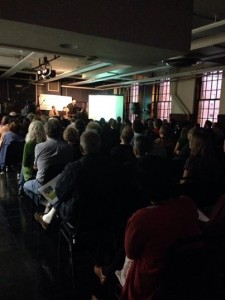

Academic Freedom & Political Dissent: A Conversation with Katherine Franke and the Community
We continue to report on Professor Steven Salaita’s case and the concerns regarding established principles of academic freedom. We hear a presentation by Katherine Franke, Professor of Law at Columbia University. Listeners may recall that Professor Salaita was unhired from the American Indian Studies program at the University of Illinois at Urbana-Champaign because of his statements on social media criticizing Israel’s conduct of military operations in Gaza. We reported last month on Law and Disorder that scholars from law schools around the country came out with a letter condemning the decision of the University of Illinois to unhire Professor Salaita. Katherine Franke discussed Salaita’s case at the University of Illinois at Urbana-Champaign late last month.
Speaker – Katherine Franke, Isidor and Seville Sulzbacher Professor of Law; Director, Center for Gender and Sexuality Law at Columbia University. She was awarded a 2011 Guggenheim Fellowship, and is among the nation’s leading scholars in the area of feminism, sexuality and race. In addition to her scholarly writing on sexual harassment, gender equality, sexual rights, and racial history, she writes regularly for a more popular audience in the Gender and Sexuality Law Blog. Franke is also on the Executive Committee for Columbia’s Institute for Research on Women and Gender, and the Center for Palestine Studies and teaches at a medium security women’s prison in Manhattan. Her legal career began as a civil rights lawyer, first specializing in HIV discrimination cases and then race and sex cases more generally. In the last 25 years she has authored briefs in cases addressing HIV discrimination, forced sterilization, same-sex sexual harassment, gender stereotyping, and transgender discrimination in the Supreme Court and other lower courts.
—————————————————————-

Please help support Law and Disorder, the show is now a sponsored project of Fractured Atlas, a non-profit arts service organization. Contributions for the charitable purposes of Law and Disorder must be made payable to Fractured Atlas only and are tax-deductible to the extent permitted by law.
Censorship, CIA Sponsored Terror, Civil Liberties, Criminalizing Dissent, FBI Intrusion, Green Scare, Human Rights, NSA Spying, Political Prisoner, Supreme Court, Surveillance, Truth to Power, War Resister
Podcast: Play in new window | Download
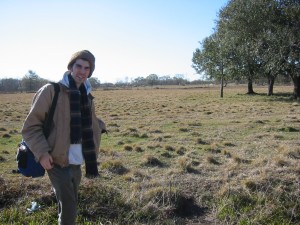
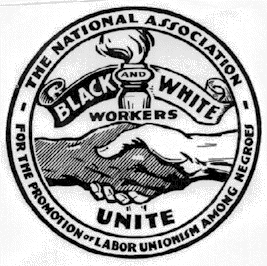
Folk Music, Labor Movements and Radical Politics
Especially in times of revolution or crisis, the role of music has been a defining element in telling the stories of labor movements, against the war in Vietnam and civil rights. Folk musician Eli Smith gave a presentation at the Left Forum this year on satirical songs of the IWW including the work of Joe Hill and many others. The early works of Pete Seeger, Woody Guthrie are a great place to start along with the lesser known work of John L. Handcox, and the Southern Tenant Farmers Union. It was the first racially integrated union in the South that used indigenous folk music to fight for the rights of sharecroppers.
Guest – Eli Smith, a banjo player, writer, researcher and promoter of folk music living in New York City. Eli is a Smithsonian Folkways recording artist and produces two folk festivals annually, the Brooklyn Folk Festival in the Spring and Washington Square Park Folk Festival in the Fall. He has appeared as a guest on terrestrial radio stations such as WBAI, WNYC, WKCR and WDST in New York and KPFA, KPFK and KUCI in California. Eli has presented panels and discussions on folk music at the Left Forum conference at Cooper Union and at the Podcamp podcasting conference in New York City. He has performed and recorded with his old time string band The Down Hill Strugglers, Peter Stampfel, John Cohen and Sam Shepard. The Down Hill Strugglers were recently featured on the soundtrack album to the Coen Brothers’ film “Inside Llewyn Davis,” which was produced by T Bone Burnett.
———
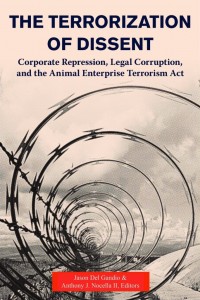
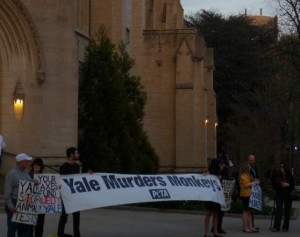
Terrorization of Dissent: Corporate Repression, Legal Corruption, and the Animal Enterprise Terrorism Act
Terrorization of Dissent: Corporate Repression, Legal Corruption, and the Animal Enterprise Terrorism Act is a collection of essays by lawyers, scholars and activists that includes interviews with those who suffered from the AETA’s conspiracy provisions. Editors Jason Del Gandio and Anthony Nocella have compiled essential information to document how the Animal Enterprise Terrorism Act is a clear violation of the First Amendment. Specifically, the book documents how corporations and the U.S. Government conspire under this law to prosecute animal rights activists and acts of civil disobedience involving environmental issues under the specter of terrorism. Right now, according to Nocella and Del Gandio, corporate profit determines what can or can’t be done to animals and the environment.
Anthony Nocella:
- The importance of this act has really shaped how the government looks at one of the larger movements in the United States.
- The animal advocacy, animal rights, animal liberation movements have been demonized and stigmatized as terrorists, through the media and the government through this particular act.
- What are the effects of this law? Who influenced this act to be pushed into law? It wasn’t really government.
- There were main organizations that pushed this law into effect. The Animal Enterprise Protection Coalition, The Animal Legislative Exchange Council (ALEC) The Center for Consumer Freedom.
- Any logical CEO of a corporation will say I don’t want anything to threaten my product.
- That product in the case of animals is any where from circuses to sea world, to clothing, from leather to fur, to also eating.
- We can do away with circuses and fur and a lot of different clothing, but one thing we can’t live without is food.
- We have to look at the real conflict and that’s between food.
- Do we want people to have a plant based diet or an animal based diet?
- There are hundreds of billions of dollars protecting that paradigm of people eating meat, fish and chicken.
- If anyone threatens that industry, under the Animal Enterprise Terrorism Act, you’re deemed a terrorist.
- To wash away all the rhetoric that is what this law is specifically speaking about. That’s why it was expanded from the Animal Enterprise Protection Act to the Animal Enterprise Terrorism Act.
- CCR Condemns Terrorism Indictment for Activists Freeing Mink from Fur Farms
- The point is – regarding the book, law schools, political science departments, think tanks, need a text that comes from a variety of viewpoints specifically looking at the Animal Enterprise Terrorism Act.
- I think we have understand the difference between how corporations are influencing laws and literally writing the bills into laws and into effect, while political repression is really law enforcement and senators influencing laws.
- We’re not criminalizing activists like we did in the 70s and 80s, now we’re labeling them as terrorists.
- National Weekend of the Animal Enterprise Terrorism Act – Sept 5-6-7, 2014
- Website – The Institute For Critical Animal Studies
Guest – Anthony Nocella II, Ph.D., an intersectional academic-activist, is Senior Fellow of the Dispute Resolution Institute at the Hamline Law School, co-founder and Director of the Institute for Critical Animal Studies, and editor of the Peace Studies Journal. He has published more than sixteen books including Terrorists or Freedom Fighters?: Reflections on the Liberation of Animals (2004), Call to Compassion: Religious Perspectives on Animal Advocacy (2011), and Defining Critical Animal Studies: An Intersectional Social Justice Approach for Liberation (2014).
————————————————————————————-
CIA Sponsored Terror, Civil Liberties, Criminalizing Dissent, Crony Capitalism, Human Rights, NSA Spying, Political Prisoner, Prison Industry, Prosecution of the Bush Administration, Supreme Court, Surveillance, Targeting Muslims, Torture, War Resister
Podcast: Play in new window | Download
Updates
- Chilean Court Finds American Journalist Charles Horman Was Murdered With Help of US Government – CCR Case
- Appeals Court Rules Victims of Torture at Abu Ghraib May Sue Private Military Contractor CACI Al-Shimari v. CACI
- Happy Birthday To Julian Assange From Law and Disorder Hosts
- Hobby Lobby: Continued Attack On Women’s Reproductive Rights
- The Meaning of the Fourth of July For the Negro By Frederick Douglas
——
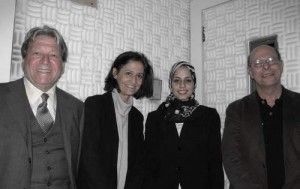
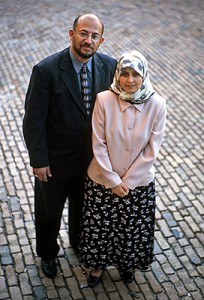
Federal Court Dismisses All Charges Against Dr. Sami al-Arian
In very good news last week the US Department of Justice dropped all of its criminal charges prosecutions etc of activist and Palestinian professor Sami Al Arian. They’ve been trying to persecute, charge him etc. for over 11 years. The case began in 2003 as a criminal case. Although he was charged with some 14 counts he was convicted of none. Rather than face trial again Al-Arian pled guilty to one count served some time and most of us thought it was over by then. He had an agreement that he couldn’t be further prosecuted, that they wouldn’t go after him any longer but that he could be deported. Unfortunately the Department of Justice had a what you would have to call an Islamophobic vendetta against Sami Al Arian. They went after him again, first with the civil contempt of a grand jury he did time for that and in then something utterly unusual they charged him with criminal contempt. The criminal contempt case was pending for five years finally, last week the Department of Justice, the prosecutors dismissed that case.
Laila Al-Arian:
- We’re feeling a sense of relief that this nightmare appears to be coming to an end.
- We’re happy to hear about the government dismissing the charges against my father.
- In a way it’s vindication for my father, we said in the very beginning. It’s been 11 years. We said all along this is a political case.
- If my father truly were a criminal, they would try their utmost to keep him in prison. Not to say political prisoners aren’t often arrested unjustly, tried and imprisoned but we’re hoping that this finally means this saga will end and my father can live as a free man.
- What preceded it (2003 indictment) was really a decade of harassment. The FBI basically tapping our phone calls, not just my father’s but siblings and I as well. When you think of the Snowden disclosures and the NSA spying on people, for us this is a reality.
- We had no sense of privacy growing up. Simply because my father was a Palestinian activist who dared to challenged the common narrative that you normally hear in the United States.
- Because he really dared to offer a different perspective and to try to help people being subjugated and occupied, so because of that he became a target, not only of the FBI but really powerful pro-Israel voices and forces here in the U.S who tried to smear his name for many many years, accused him of being a terrorist.
- That was part of it, because he was an advocate on Palestinian human rights but also because he was a person who really thought to involve American Muslims politically.
- A lot of these forces I mentioned after 9-11, they really exploited the atmosphere with fear and hysteria and tried to paint my father as this menacing figure, as a terrorist, and at time when the Bush Administration should have been working with American Muslim leaders and try to build a bridge between east and west. Instead the targeted my father and tried to make an example out of him, to say that if you dare to speak out this is what will happen to you.
- He ended up being arrested in 2003 and placed in some of the most atrocious and inhumane conditions that even Amnesty International condemned and was held basically for 2 and a half years before he was basically put on trial.
- The trial lasted for six months, the government spent millions and millions of dollars on the case. They even flew in witnesses from Israel to testify about things my father had nothing to do with.
- After months of negotiations my father signed a plea agreement to end his case once and for all. The government ended up violating the key agreement and basically a prosecutor here in Virginia on ended up at bringing him here and trying to basically retry the Florida case despite the agreement and tried to get him to testify in another case against a Muslim think tank in Virginia and when he refused to testify for the violation of the pre-agreement he was held first on civil contempt and then charged criminal contempt.
- It was very clear that the true intent of this Islamophobic and pro-Israel prosecutor Gordon Kromberg is to retry the Florida case in Virginia, basically pretending it was another case when all of the questions had to do with the Florida case.
- Then the judge received a couple of motions from my father’s attorneys asking to fully dismiss the case and there were no rulings in the past few years by the judge and finally the government decided to drop the charges.
- Luckily in the fall of 2008, my father was released on bail. He was released on house arrest.
- It’s really a testament that there is no case. The think tank that was investigated by Kromberg wasn’t charged for a single crime. They convened one grand jury after another and there were never any charges, any indictment.
- My father was a professor at the University of South Florida, a professor of computer engineering when he was arrested. It’s a very complicated case, as we mentioned stretches over a decade. It’s a case that actually outlasted the Iraq War.
- The next step is in the plea agreement my father unfortunately at the time his back was against the wall, he did end up agreeing to deportation, so now we expect that he will be deported. But as a stateless Palestinian, we don’t know where he’ll be deported.
- My father’s trial attorneys were Bill Moffet and Linda Moreno.
Guest – Laila Al-Arian, a writer and producer for Al Jazeera English. She helped produce the network’s Palestine Papers special in January 2011, a four-day program on the largest diplomatic leak in the history of the Palestinian-Israeli conflict. She is the co-author of Collateral Damage: America’s War Against Iraqi Civilians She is the daughter of Professor Sami Al-Arian.
—–
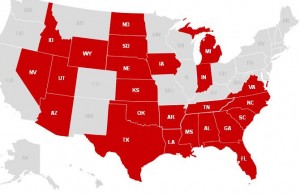
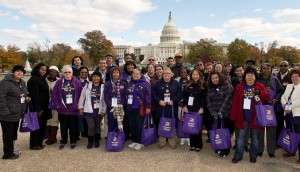
Supreme Court Delivers Blow to Organized Labor
Last week the United States Supreme Court decided on the case Harris v. Quinn ruling that some government employees didn’t have to pay any fees to the unions representing them. The case was brought by 8 Illinois workers who provided home care to Medicaid recipients. Some of the plaintiffs were mothers who were personal assistants to their disabled children and opposed joining the union. In a 5-4 majority, Justice Samuel Alito Jr.concluded there was type of government employee called a partial public employee who can opt out of joining a union and not be required to pay union fees.
Labor Attorney Bill Herbert:
- Harris versus Quinn I what the ramifications of it while the court held that the majority held that a statute in in Illinois that provided for requiring employees in a bargaining unit to pay agency fee to union was unconstitutional and therefore struck down a provision of a contract that require those employees to pay a fee for being represented by the union.
- These are domestic workers who work for people who are ill and who but also that their salaries and the benefits are paid for by the state.
- These are public employees defined by state law as public employees but it is a background in the National Labor Relations Act which is the Wagner act which was past in 1935 specifically exempts domestic workers in farmworkers from representational rights. These employees if they were just hired by someone to come to their home would not have any rights under the National Labor Relations Act.
- In 1947 Taft-Hartley was passed, Taft-Hartley allows for states to pass laws which are called right to work laws or referred to as right to work laws.
- A state can prohibit a contract to provide that people who decide not to join the union still have to pay a fee related to the representation.
- For public employees there was a case decided in 1977 called Abood which came out of Detroit. In 1977 case public employees it was found constitutional to establish a procedure where people were not members of the public sector union still have to pay a fee for the representational rights that’s negotiations etc. but don’t have to pay for what is sometimes is ideological work which would be in a political activity such as supporting candidates etc.
- There was a procedure created where people can object and they can go in and raise issues and seek to have only monies relevant to collective-bargaining be a part of their fee, so that was Abood.
- The heart of wages and benefits are something that are set by the state. It’s called joint employer relationship.
- The court in the Harris v. Quinn case ruled that its unconstitutional for these employees to be required to pay a fee for the benefits they received based on the representation provided by the union.
- It’s interesting to compare this to Citizens United. In Citizens United, shareholders who are opposed to what a corporation may spend in terms of money for political action in terms of supporting candidates, had no say.
- The Supreme Court found that in Citizens United the First Amendment gives corporations First Amendment rights and the share holders have no say.
- In this case the Supreme Court held that these employees don’t have to pay anything for being represented by the union in collective bargaining for the state.
- Domestic workers are usually low wage employees, very high turn over, people who are generally receiving the low end of the pay scale.
- What we’re looking at is constitutionalizing this concept which was previously statutory in the private sector and making it such that other statues around the country where states have intervened in providing for representational rights for people excluded from the National Labor Relations Act.
- These other statutes may now be challenged based on this ground and in the future it’s based on language of the decision. It’s conceivable that this case could at least the verbiage in the majority decision which Justice Kagan referred to is good to as gratuitous dicta about Abood decision and why was wrongfully decided is something then they come back to be utilized in future cases in future challenges against the requiring union members of bargaining you do not union members to pay a fee.
- In Illinois and in other states domestic workers have been working in the doing a lot of work towards organizing to provide the collective bargaining but for example in New York they don’t have the right to collectively bargain nor farmworkers in other states both farmworkers and domestic workers have rights to unionize.
- These kind of this decision where depending on the structure that the state’s designs could be subject to build the other statues they subject to challenge legally.
- One of the ironies in this case is that one of the reasons why these agency fee arrangements have been states have put them into place is to create stability within bargaining is not having multiple unions trying to come in and and try to organize employees or having conflicts between members who are paying for the services against people who are not paying so the legislatures when they pass in Illinois for example they when they passed the statute were seeking to provide stability in the workplace. Most “Right to Work” states are in the South.
- The current time is being described as the new Gilded Age and new Gilded Age is about wage disparity but is also other things including job security and issues involving the pensions.
- Tenure is under attack pensions are under attack and now there’s an attack upon the idea of having to pay representative to provide you with with representation. A lot of the initiatives that have been enacted in the 20th century are being stripped away and it’s being tied with basically the new Gilded Age.
- The good news of the decision was that Abood was not overturned.
Guest – William A. Herbert is a Distinguished Lecturer at Hunter College, City University of New York and a former Deputy Chair and Counsel to the New York State Public Employment Relations Board (PERB). Prior to his tenure at PERB, Bill practiced labor and employment law in federal and state courts, administrative agencies and in arbitration. Bill is one of the editors of the treatise Public Sector Labor and Employment Law, Third Edition and he has written and spoken extensively on public sector labor law and history.
——————————————————
CIA Sponsored Terror, Civil Liberties, Criminalizing Dissent, FBI Intrusion, Habeas Corpus, Human Rights, Iraq War, NSA Spying, Political Prisoner, Prison Industry, Supreme Court, Surveillance, Targeting Muslims, Torture, War Resister
Podcast: Play in new window | Download
Updates:
- Michael Ratner: Guantanamo Bay Prisoner Exchange
- Five Taliban In Exchange For A U.S. Prisoner Held In Afghanistan
- 149 Detainees Left In Guantanamo Prison – 88 Cleared For Release
- Michael Smith Reports Back On Highlights At the 2014 Left Forum
——
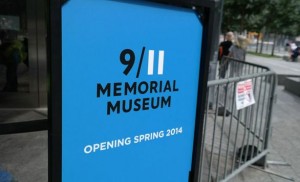
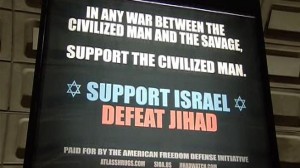
9/11 Memorial Museum Protests
There were many protests during the official opening of the 911 Memorial Museum. Muslim communities and other groups have voiced concern about the film in the musuem titled “The Rise of Al-Qaeda” and how it fails to adequately discern between Al-Qaeda and those of the Islamic faith. Meanwhile, the museum’s official response is that the film is objectively telling the story of what happened.
Donna Nevel:
- We came together because of a concern about a video they were showing called The Rise of al-Qaeda. It’s a 7 minute documentary and the concern is about the problematic language that its using. It makes it seem as if the acts of 9-11 are equated with Islam.
- Our feeling is that the film needs to be edited and could exacerbate an already anti-Muslim climate.
- Quoting criticism – The film in its current state presented risks that visitors would assign collective responsibility for September 11th to Islam and all Muslims.
- There’s a historian Todd Fine who says its an inconsistent array of terminology that gets carelessly thrown around with little concern for the harmful impact it can have on people.
- The video didn’t do enough to separate al-Qaeda from Islam and from mainstream Islam. It’s reckless.
- Despite the fact that the own museum’s own advisory board was instantly concerned when they saw the film and said it should be reviewed and edited – despite the fact that 400 scholars wrote letters saying it contains problematic and contested terminology that conflates terrorism with Islam – and despite the fact that leaders from so many different inter-faith communities have spoken out about this – that the museum continues to stand by its decision not to edit the video – is astonishing.
- I was doing a little research on her (Debra Burlingame-on 911 Memorial Museum Board of Directors) and there’s a high number of racist quotes she’s said. “Islam’s a transnational threat.”
- Millions and millions of people will be going to this museum and museums can have a big impact.
- We have to remember that this is in the context not of a society that welcomes and embraces the Muslim community but one that’s surveilling the Muslim community.
- It’s feeding into this notion that all Muslims are responsible for the acts of a few individuals.
- This video also feeds into police surveillance because what do they say? After 911 we have to be more vigilant and that means surveilling an entire community.
- Communities are coming together and speaking out, including about this video.
- We have to change the structures that enable this to happen. The Islamophobes are really problematic and have connections to some of the institutions.
- We have to make sure our institutions are fomenting Islamophobia.
- Book – Islamophobia and Israel by Elly Bulkin and Donna Nevel
- We wanted to analyze the intersection of Islamophobia and Israeli politics and to look at the way the “war on terror” impacts both. Also to raise an issue that’s basically taboo in the Jewish community as well as outside the Jewish community.
- We have 4 different areas that we look at. Our lengthiest area is “follow the money” where you basically see how connected the Islamophobes are with right-wing Israel crowd, the settlement movement and others as well.
- Jews Against Islamophobia / Jews Say No / Jewish Voices For Peace / Jews For Racial and Economic Justice
- Contact Donna Nevel – denevel(at)gmail(dot).com
Guest – Donna Nevel, a community psychologist, educator, and writer whose work is rooted in Participatory Action Research (PAR) and popular education. Co-author with Elly Bulkin of Islamophobia and Israel. She has been involved with a wide range of organizing efforts to challenge segregation and inequality and further equity and racial justice in public education. She has also been a long-time organizer for Palestinian-Israeli peace and justice and works with groups to challenge Islamophobia and anti-Arab racism.
——
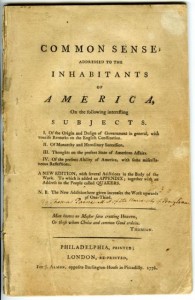
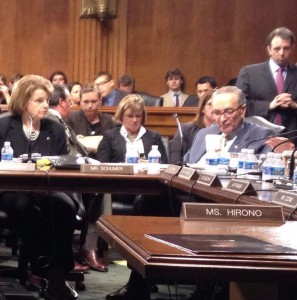
Free Flow of Information Act (Journalist Shield Law)
Current shield laws for journalists in the United States have broad exceptions for national security. This means that a prosecutor can override the law by showing how the information sought would “materially assist” the government in “preventing” or “mitigating” an act of terrorism. Initially, the shield law is set up to provide a confidentiality privilege for journalists so a police officer or FBI agent can’t get that information even with a court order unless there is an unusually strong justification for it. The latest version of the shield law as of September 2013 has a clause telling judges that it only covers legitimate news gathering. This of course makes very easy to declare any kind of news gathering you don’t like as illegitimate, and therefore the sources are not protected. Last month, the House of Representatives voted to approve an amendment to an appropriations bill barring the Justice Department from compelling reporters to testify about confidential sources.
Carey Shenkman:
- We are going to get a shield law but its going to be one that doesn’t protect any journalists or sources.
- It’s a lot easier for the FBI and the DOJ to just skip the investigation and go straight to the reporters. Why do they have to any work when they have the journalist getting all the sources for them.
- They subpoenaed records from the Associated Press last summer, they subpoenaed the source for James Risen who wrote a book and that actually appeared before the 4th Circuit of Appeals and was turned down by the Supreme Court for review.
- There’s been a push to try and pass a shield law before but Obama back in 2009 said he wouldn’t let any shield law pass that didn’t have a big national security exemption.
- What happened back in September is that there was a massive compromise with 2 Senators, Diane Feinstein from California and Dick Durbin from Illinois. They wouldn’t let this law go through unless it contained a big national security exception. Meaning any reporter covering national security would have to disclose their sources, and second it had a big exclusion for wikileaks and other organizations that published leaks.
- There’s actually a balancing test as part of this law that tells judges to consider if a journalist is engaged in legitimate news gathering. This is problematic because anyone can be a journalist, this has been the case since the founding of this country.
- They’re trying to put into law the fact that some journalists are legitimate and some are illegitimate.
- The internet has brought this country back to the time of its founding in terms of journalism because when the “press clause” in the First Amendment were passed, anyone could be a journalist.
- The “press clause” was defined as the right to publish.
- I believe we do need shield laws, but not this shield law.
- I think there is a big push by the institutional media to keep journalism as a profession, but that’s not what journalism is. Now with the internet, anyone can publish. As long as anyone as the intention to disseminate information, they should be protected as a journalist.
- When it helps the government the definition of the media is very broad.
- It’s going to be political suicide if Holder or anyone from the Obama administration pushes to send James Risen to jail.
- The DOJ argued in an affidavit that James Rosen was aiding and abetting his source.
- More and more, we’re seeing this administration trying to frame the news gatherer and the source, not as a journalist and a source but as criminals in a conspiracy.
- I was a radio journalist for 3 years. I used to work at the Center for Constitutional Rights where I met Michael Ratner and was involved with Chelsea Manning’s trial.
Guest – Carey Shenkman, has worked with several legal teams including Chelsea Manning’s defense, and legal research defining the protection of new media under the Bill of Rights and The U.S. Constitution.
——————————————————————————————
Afghanistan War, CIA Sponsored Terror, Civil Liberties, Criminalizing Dissent, Human Rights, NSA Spying, Political Prisoner, Prison Industry, Supreme Court, Surveillance, Torture, War Resister
Podcast: Play in new window | Download
Updates:
- NSA Collecting MetaData And Content On Five Countries
- Julian Assange-Glenn Greenwald Twitter Storm
- Host Discussion On NSA Ubiquitous Data Collecting
——-
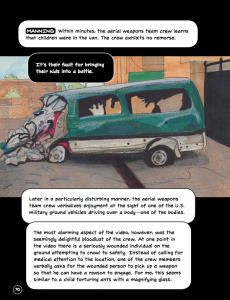
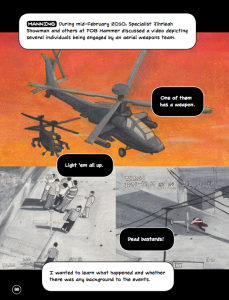
The United States vs. Private Chelsea Manning
Last year our own Michael Ratner made many trips to Fort Meade to attend the very secretive Private Chelsea Manning trials. Michael had also explained in past shows about how he heard Chelsea testify as to why he released each set of documents such as the Iraq war logs, the Afghanistan war logs, State Department cables and more. She said her decision to release the documents were done as an act of conscience. Our guest Wikileaks activist and artist Clark Stoeckley was also at this historic trial. His recent graphic novel titled The United States vs. Private Chelsea Manning is a collection of his vivid sketches from inside the court room. He joins us to talk about his work as an activist and his experiences producing the book. Welcome to Law and Disorder.
Clark Stoeckley:
- As I understand the transcripts are still under seal.
- Those sketches took a little bit longer, ones that where full court room where I drew a lot of people.
- I would work in pencil and draw as quickly as I could everything that I saw in the court room and then I would come back and fill it in with color and hard outlines.
- What she was doing was offering up 20 years of her life, accepting full responsibility and that takes a lot of courage and bravery to do that – being the smallest person in the court room and being noble about it.
- Unfortunately the media wasn’t there to catch the pre-trial. They only showed up on the first day and then the sentencing and the verdict.
- I remember how the court room fell to a complete silence when that video came on and the tears, and the blank stares on the prosecutions’ faces.
- I’m looking through the book right now, I see you, you’re in the picture there Michael Ratner, in the background sitting behind Chelsea.
- 35 years was the sentence and that’s going to be appealed. As I understand the appeal will start as early as December.
- They didn’t like that we’re holding vigils every week and holding large protests there. They shut down the road and they had to re-route traffic. It was the largest protest Ft. Meade had every seen.
- Just a heads up to anyone who wants to correspond with Chelsea, you know have to use the name Chelsea when addressing envelopes. http://www.chelseamanning.org/
- I just started putting them in libraries today.
- CHELSEA E. MANNING 89289 / 1300 NORTH WAREHOUSE ROAD / FORT LEAVENWORTH, KANSAS 66027-2304
Guest – Clark Stoeckley, is an artist and author of the book The United States v. Private Chelsea Manning. He’s also the owner of truck with the WikiLeaks logo emblazoned on it. Stoeckley’s vivid sketches from inside the court and beyond, together with carefully selected transcripts of the proceedings, trace the arguments as they move back and forth between the defense and the prosecution.
——-
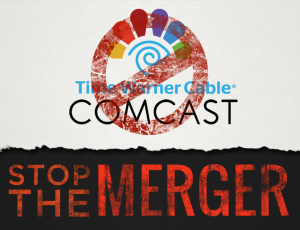

Net Neutrality – The Time Warner/Comcast Merger and New Rules Proposed By The FCC
In our last interview with attorney Matt Wood, policy director at Free Press, we talked about the 45 billion dollar Comcast -Time Warner merger and its implications to net neutrality. This proposed merger would unite the nation’s largest cable TV and internet service provider with the second largest cable company. If combined, these companies would offer service to two thirds of U.S. households. We get an update on the merger and we also discuss the new rules proposed by the FCC about net neutrality. Net neutrality essentially means preventing unreasonable discrimination against content on the internet. The Free Press maintains that the new FCC rules would kill rather than protect net neutrality and allow rampant discrimination online.
Attorney Matt Wood:
- What the court said was that you can’t treat broadband providers as common carriers – not as some insurmountable conclusion but simply based on the way the FCC has decided to treat them up to this point.
- So the FCC up to this point has tried to deregulate and yet tried to maintain some of the protections we all need from our communications.
- Though its in the FCC’s discretion according to the majority and according to the DC circuit, what the courts have said, the FCC has made this decision in the past. They still haven’t reversed it, they still want to say that broadband is not a common carrier service and therefore the FCC can’t adopt common carrier or common carrier like obligations for broadband.
- There’s obviously a grave concern to government secrecy and censorship especially when it comes to whistle-blowers and the kind of information that Edward Snowden brought to all of us.
- If you used the phone to commit a crime whether that is wire fraud or you’re talking to your co-conspirators about how to conduct the crime. It is not the telephone company’s place and either say you can or can’t make that call.
- Net neutrality is a way of insuring that the carrier of our speech (that’s typically a private company) doesn’t have a role or not in deciding whether that speech goes through.
- If and when the government steps in and says hey we want to tap that line because we’re actually conducting an investigation or if and when there’s a punishment for the activity that you used the phone to plan that’s obviously a very important legal debate.
- Net neutrality is not a way for the government to control our speech. It is a way to insure that our cable and phone companies do not control our speech.
- The FCC in its current mode is basically saying well even if we’re required to allow these two tiers or multiple tiers of service, we can still step in and protect you and provide a basic level of service.
- This isn’t just about big internet companies on one side and big telephone and cable companies on the other side, its about that we all use the internet especially in a cloud based system. We’re using it not just to watch movies which is an important cultural activity but to back up our files, to send educational videos.
- What the cable and telephone companies want to do is charge you extra to reach their customers and they want to charge in both directions.
- If you want to reach them at all Netflix or Google, Law and Disorder, you also have to pay us now.
- Its no secret that FCC Chairman Wheeler headed not just one but two telecommunication lobbies.
- The FCC has this proceeding that it will be running over the summer. What Chairman Wheeler has proposed we think is not good enough but its not a done deal either so the FCC will take comments not only from companies and groups like ours but members of the public.
Guest – Attorney Matt Wood helps shape the policy team’s efforts to protect the open Internet, prevent media concentration, promote affordable broadband deployment and prioritize a revitalized public media. Before joining Free Press, he worked at the public interest law firm Media Access Project and in the communications practice groups of two private law firms in Washington, D.C. Before that, he served as editor-in-chief for the Harvard Civil Rights-Civil Liberties Law Review, worked for PBS, and spent time at several professional and college radio and television stations. Matt earned his B.A. in film studies from Columbia University and his J.D. from Harvard Law School.
—————————————————————————

Please help support Law and Disorder, the show is now a sponsored project of Fractured Atlas, a non-profit arts service organization. Contributions for the charitable purposes of Law and Disorder must be made payable to Fractured Atlas only and are tax-deductible to the extent permitted by law.























